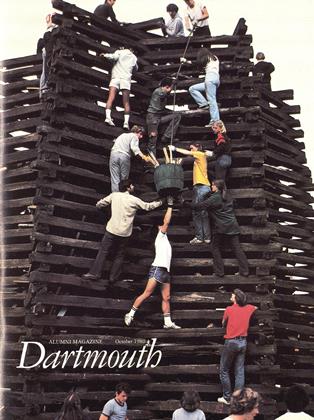MAN, WOMAN AND CHILD
by Visiting Professor Erich Segal Harper & Row, 1980. 244 pp. $9.95
THE LOVE RUN by Professor Jay Parini Atlantic-Little Brown, 1980. 210 pp. $10.95
ONDINE by Charles Kozloff '65 St. Martin's Press, 1980. 297 pp. $11.95
The Buffalo Evening News used to operate with one of the most famous stylebooks in journalism, its small pages providing the paper's reporters with tips 'on grammar, usage, and morals. One of its more worthy pieces of advice comes at the end of the book, just below the admonition on "disorderly houses" ("please omit the specific address"). It says, simply: "Don't drag in the names of respected institutions in crime headlines." And then it gives an example; "Yale Professor Admits Forgery."
I was reminded of that line from the stylebook - since replaced, I regret to say, by a wire service version that has none of its style and panache when I completed these three books this summer. How horrified my old editors in Buffalo would be by a story headlined: "Dartmouth Profs, Alum Write Bad Books."
In a way, the editors would be right. Such a headline would be unfair both to Dartmouth and, yes, even to "Dartmouth Profs, Alum." For, in truth, one of these books Erich Segal's Man. Woman and Child is actually quite good. It's the story of Robert Beckwith, his one lapse from marital fidelity and the boy who was born of it, and it is, as they say in the trade, a good yarn.
It has a particularly endearing flashback to the Beckwiths' college courting days (he was Yale '59, she Vassar '60), where Bob and Sheila meet at a mixer starring a group called Rumple and the Stiltskins. And then there are winning portraits of the Beckwiths' two daughters, a 9- year-old who calls him Bob and a 12½-year-old who calls her family "bourgeois" (which it is) and who thinks Cape Cod "tedious" (which it isn't). To make a short story shorter, the mother of the long-hidden love child is killed in an automobile crash and the youngster arrives in Cape Cod to spend the summer with the Beckwiths.
Segal, a perennial visiting professor of classics, has been so successful that his sort of story has spawned something of a genre, "The Love Story Story." I suspect Jay Parini, a full- time member of the Dartmouth faculty, set out to write himself an L.S.S. when he conjured up The Love Run, an unlikely tale set in a Dartmouth summer term: A young Enfield ne'er- do-well is imprisoned by his desire for a wealthy Dartmouth student, herself the prisoner of a campus romance that has none of the salt and pepper of Jenny and Oliver. A literature professor straight out of central casting (or Animal House1.) also has his eye on her. In the end, nobody gets the girl.
The-twists and turns of this book most of them occur in one bedroom or another, and they are not especially artful reach the frontiers of plausibility. The dialogue is stiff, contrived, with the boys from Enfield sounding more like stereotypical Eastern European immigrants ("You want for me to get some beer?" one of them actually says) than Emmets. All that aside, I guessed most of the story by the middle of page 10 and filled in the final essential element by the fourth sentence on page 36.
On to the final book. The words "Love, sex, power, passion, greed" appear on the book- jacket of Charles Kozloffs Ondine. That, unfortunately, says it all. It is the story (quoting the book jacket again) of "the REAL games played in Atlantic City casinos." The stuff inside follows that general theme. Not surprisingly, it is a sordid tale more sordid, in fact, than the real Atlantic City with its tawdry souvenir outlets, low-lit junk-food emporia, and the booth where visitors pay 75 cents and, as the sign proclaims, see a woman "change from a live girl into a gorilla before your eyes." As for myself, I'll take the gorilla any day.
David Shribman is a Washington-based writerand member of the advisory board of theALUMNI MAG A ZINE.
 View Full Issue
View Full Issue
More From This Issue
-
 Feature
FeatureA Triumphant Failure
October 1980 By Peter Bridges -
 Feature
FeaturePornography in Our Time
October 1980 By Mary Ellen Donovan -
 Feature
FeatureWhat It Was Was Grid-Graph
October 1980 By John R. Scotford Jr. -
 Feature
FeatureA Collection of 'Erotic Capital'
October 1980 By Margaret E. Spicer -
 Article
ArticleIntellectual Athlete
October 1980 By Don Rosenthal '81 -
 Class Notes
Class Notes1978
October 1980 By JEFF IMMELT
David M. Shribman '76
-
 Article
ArticleA Certain Uncertainty
September 1975 By DAVID M. SHRIBMAN '76 -
 Article
ArticleThe Silly Season
November 1975 By DAVID M. SHRIBMAN '76 -
 Article
ArticleDart-myth
March 1976 By DAVID M. SHRIBMAN '76 -
 Article
ArticleIn Punt Formation
May 1976 By DAVID M. SHRIBMAN '76 -
 Books
BooksSoiled Pinstripes
October 1979 By DAVID M. SHRIBMAN '76 -
 Article
ArticleDark Horse of a Different Color
April 1980 By David M. Shribman '76
Books
-
 Books
BooksWILD BIRDS AT HOME
November 1935 By Dr. Frederic P. Lord '98 -
 Books
BooksBEAU-POIL AU MAROC
June 1940 By F. Cudworth Flint -
 Books
BooksTHE ELUSIVE PLATO
JUNE 1930 By Harold E. B. Speight -
 Books
BooksNO SHIP MAY SAIL
June 1942 By Herbert F. West '22 -
 Books
BooksTHE MYTHMAKERS: AN ESSAY ON POWER AND WEALTH.
JULY 1964 By MARTIN SEGAL -
 Books
BooksCHURCH UNION: WHY NOT
July 1948 By Rev. Chester B. Fisk.


